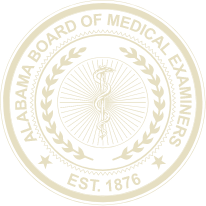Content has been preserved in its original form and syntax. Modifications were made only to protect the interest of private citizens and to facilitate readability.
Xiulu Ruan, MD 66857019 E1
F.C.I. Oakdale 1
P.O. Box 5000 Oakdale, LA 71463
July 16, 2019
Mark H. Lequire, MD, Chairman
Michael T. Flanagan, MD, Vice Chairman Alabama Board of Medical Examiners
P.O. Box 946 Montgomery, AL 36101
Dear Drs. Lequire and Flanagan:
It must be quite a shock for you to receive a letter from a physician felon. I was convicted as a mobster after a seven-week jury trial in the Southern District of Alabama on February 23, 2017, and am serving a twenty-one year sentence in a federal prison In Oakdale, Louisiana. As a result of my indictment and subsequent conviction, I have lost my Alabama medical license, along with those of Michigan, Florida, and Mississippi. However, the truth of the matter is that I have not committed any crime; I have been only criminalized and vilified.
The purpose of my letter to you is manifold. Though this may seem to serve as a means of venting my indignation about the grave Injustice of my case, this is not my main goal. Despite the fact that I feel quite urged to share with you the horrendous ordeal and misery that my family members and those close to me have gone through, I want to focus on a broader issue, namely the movement to prosecute physicians in this nation. It is mainly for this reason that I have decided to share with you what I have recently written. Using my own trial as a foundation, I aim to show how, in this country, a well-trained physician can be selectively targeted, deliberately ensnared, inappropriately tried, and wrongfully convicted.
It is well recognized that 97% of federal convictions and 94% of state convictions are the result of guilty pleas. In his book entitled “Prosecution Complex,” Daniel S. Medwed (a Professor of Law at the University of Utah and a legal scholar in the field of wrongful conviction) opines: “There is a stark sentencing differential in the American criminal justice system depending on whether a defendant pleads guilty or is convicted after a trial. Defendants who reject a plea offer customarily receive a steeper sentence upon conviction on those charges after trial than the one contained in the plea offer” (p. 61). Professor Medwed also holds that it is impossible to quantify the social cost of the current mode of plea bargaining in the United States that places pressure on innocent defendants to plead guilty (p. 60).
The overwhelming majority of prosecuted physicians choose to sign plea agreements with the government, and by doing so they have given up their rights to challenge or openly present their cases to the public. On the other hand, the prosecutors representing the federal government have total control in deciding what the public should be told in each case. Deliberate misrepresentation in order to unfairly prejudice against the defendant physicians is a general rule rather than an exception. Here I want to substantiate the aforementioned point with the use of my medical credentials as an example.
As a fellowship-trained, board certified interventional pain management specialist, I took a great deal of pride and had devoted my level best effort in building up my professional credentials. At the time of my arrest in May 2015, I had an active and unrestricted licenses in four states, namely Alabama, Michigan, Florida, and Mississippi. I also had eight active medical board/subspecialty certificates, including Physical Medicine & Rehabilitation, Pain Medicine, Addiction Medicine, Electrodiagnostlc Medicine, lnterventional Pain Management, Subspeclalty Board Certification in Neuromuscular Medicine and Pain Management, as well as a board certificate by the American Board of Independent Medical Examiners.
Further, I was an active member in a host of national specialty/subspecialty societies such as the American Society of lnterventional Pain Physicians (ASIPP), the American Academy of Pain Medicine (AAPM), the American Society of Addiction Medicine (ASAM), the American Pain Society (APS), the American Academy of Physical Medicine & Rehabilitation (AAPMR), and so forth. I had served a number of leadership roles in some of them and their state chapters, for example, at the time of my indictment, I served as the President of the Alabama Society of lnterventional Pain Physicians (under ASIPP), as well as being the Immediate Past President of the Alabama Society of Addiction Medicine (under ASAM). I had previously also served as a National Director-at-Large in the ASIPP.
Academically, I held the title of an Adjunct Clinical Associate professor at the Department of Anesthesiology, Louisiana State University Health Science Center in New Orleans, LA, and I served as an editorial board member for a handful of professional journals. By the time of my jury trial in January 2017, and as a lead and/or corresponding author, I had published over ten dozen papers in peer-reviewed and PubMed Indexed journals such as JAMA Internal Medicine, JAMA Psychiatry, JAMA Oncology, JAMA Surgery, Neurosurgery, Lancet Psychiatry, American Journal of Psychiatry, Psychiatric Research, Pain, Pain Medicine, Pain Physician, Journal of Pain, Clinical Journal of Pain, Regional Anesthesia & Pain Medicine, Anesthesia & Analgesia, European Journal of Pain, European Journal of Cancer, European Journal of Anesthesiology, Journal of Opioid Management, American Journal of Physical Medicine & Rehabilitation, Muscle & Nerve, Journal of Clinical Pharmacology, Clinical Therapeutics, Expert Opinion on Pharmacotherapy, Journal of Pharmacological Sciences, Annals of Pharmacotherapy, Pharmacological Research, Therapeutic Advances in Drug Safety, American Journal of Hospice & Palliative Care, American Journal of Surgery, American Journal of Medical Quality, American Journal of Hematology, American Heart Journal, Journal of Rheumatology, Journal of Forensic Sciences, Forensic Science, Medicine, and Pathology, Journal of Forensic & Legal Medicine, American Journal of Forensic Medicine and Pathology, International Journal of Legal Medicine, Medico-Legal Journal, American Journal of Medicine, Academic Medicine, Addiction, Journal of Addictive Disease, American Journal of Drug & Alcohol Abuse, Journal of Analytical Toxicology, Clinical Toxicology, Journal of Medical Toxicology, Journal of Critical Care, Annals of Emergency Medicine, Annals of Epidemiology, and others.
The professional information related to my clinical training and education, academic title and publications, and board/subspecialty board certifications was easily accessible on my personal website as well as on my company website (Physicians’ Pain Specialists of Alabama). However, in the Grand Jury Indictment release on April 30, 2015, there was only one sentence given pertaining to my clinical background: “Defendant Xiulu Ruan, MD was a Mobile, Alabama physician licensed to practice medicine in the State of Alabama.”
Clearly, the prosecutors decided that none of my other qualifying information, particularly as a fellowship-trained and board certified pain specialist was relevant. They had no intention of letting the public know the full level of my professionalism.
Instead, they showed no misgivings in painting me to be an unscrupulous, fraudulent, greedy doctor who was only concerned about money. I believe this dirty tactic of character assassination is the modus operandi utilized by prosecutors when prosecuting physicians. Thus it is no longer an issue as to how a certain specialty or subspecialty of medicine is practiced; the issue has become a sociopolitical one. As a result, what physicians have learned through their clinical training and education becomes essentially irrelevant. There is no objective standard at trial; what the prosecutors ever need is an inflammatory and incriminating rhetoric that they can use to instigate confusion and prejudice among the jury against the physician defendant, who has already been found “guilty” before the trial even starts. Specifically, my trial was replete with deliberate misinterpretations, misrepresentations, and distortions. To forewarn my fellow colleagues of such vulnerability and peril (in case when being targeted and facing prosecution), is the other important reason that prompts me to share some of my writings with various physician organizations, medico-legal professionals, as well as some journalists.
Finally, please keep in mind that I have been convicted as a head “gangster” of an illusory “criminal enterprise,” following a seven-week jury trial. I believe that my case clearly represents a political persecution that is both shameful and disgraceful.
Thank you very much for your time and attention.
Sincerely,
Xiulu Ruan, MD
















I have followed your case for about a year. I’m so happy to read the contents of this letter. Wish the best for you.
I will convey the message